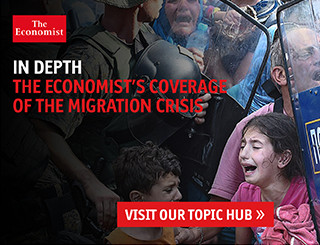EUROPEAN summits are not known for their displays of fraternity and generosity. Yet the world surely expected more from a meeting of European interior ministers, on September 14th, called to try to agree a response to the continent's growing refugee crisis. Last week the European Commission, the executive arm of the European Union, proposed a scheme to relocate 120,000 asylum-seekers from Greece, Hungary and Italy to most other EU countries under a quota system. No one expected the ministers to approve the plan in all its details. But few thought it would flop so decisively. The worst traditions of Brussels, from pernickety squabbles over wording to idle can-kicking, were on full display. Almost six months after the crisis erupted, the commission was reduced to issuing a statement that began by marking “a first step forward as a Union on the refugee crisis”. The UN declared itself “deeply disappointed” by the outcome.
It came as a surprise. With the support of the mighty German-French tandem for the commission’s plan, many thought that the countries sceptical of the proposal—notably the “Visegrad” four of Poland, the Czech Republic, Slovakia and Hungary—would at least allow discussions on the 120,000 to proceed, while parking the question of precisely how they would be redistributed. But the naysayers, led by the Czechs, refused to put their name to a document that did not contain the word “voluntary”. Hungary, although it would benefit from the plan, remains one of its fiercest foes. The moral appeals, threats and pleas came to nothing. “This is a real clash, a zero-sum game,” said one official from a sceptical country.
Another meeting may be convened to tackle the question. But with little prospect of a shift from the V4, the rest of the EU is preparing to use the nuclear option: a vote by qualified majority, which would mean overruling the sceptics. That would be “politically dangerous”, warns a diplomat from another of the eastern countries. It would certainly poison the well. But commission officials have started to say privately that no country would be forced to accept asylum-seekers it did not want. Instead, the 120,000 target might be reached, as with a previous scheme for 40,000 that the ministers approved last night, via voluntary pledges. The ministers barely discussed a more ambitious commission proposal for a permanent relocation scheme that would kick in whenever migrants surged to Europe.
The relocation proposal is at the heart of the commission’s plan to deal with the EU’s migrant difficulties. But Europe faces a much more pressing problem. Germany’s unexpected decision, on Sunday night, to impose controls along its border with Austria has triggered a series of similar moves, undermining the passport-free Schengen zone to which most EU countries belong. Austria has stepped up checks along its border with Hungary, and Slovakia has done the same for its frontiers with both those countries. The Hungarians, meanwhile, have come close to militarising their border with Serbia, erecting a razor-wire fence, dispatching troops and passing draconian new laws against illicit migrants. Arrests, and worse, will follow.
Each of these decisions is individually rational, but collectively they do nothing to solve the problem. Hundreds of thousands of refugees, mainly Syrians, are somewhere on the route between Greece and Germany that has emerged as the main pipeline for refugee flows this year. Every additional border control merely displaces the problem further down the line. Tensions between Hungary and Serbia will surely grow. Later this week there may be trouble along the Serbia-Macedonia border, and then on Macedonia’s border with Greece. And with 5,000 people still reaching the Greek islands from Turkey every day, the dangers of bottlenecks are clear. Meanwhile people-smugglers are already scouting out new routes into central Europe, perhaps via Croatia and Slovenia, or by sailing from Albania to southern Italy.
Political tensions are growing as markedly as migratory ones. Today Thomas de Maizière, the tough-talking German interior minister, proposed cutting EU structural funds for countries that refused to take quotas of refugees. There is little chance of that happening. But a worrying picture is emerging. Just when the need for Europe’s governments to co-operate could not be clearer, the prospect of them doing so is becoming ever-more distant.

Sem comentários:
Enviar um comentário